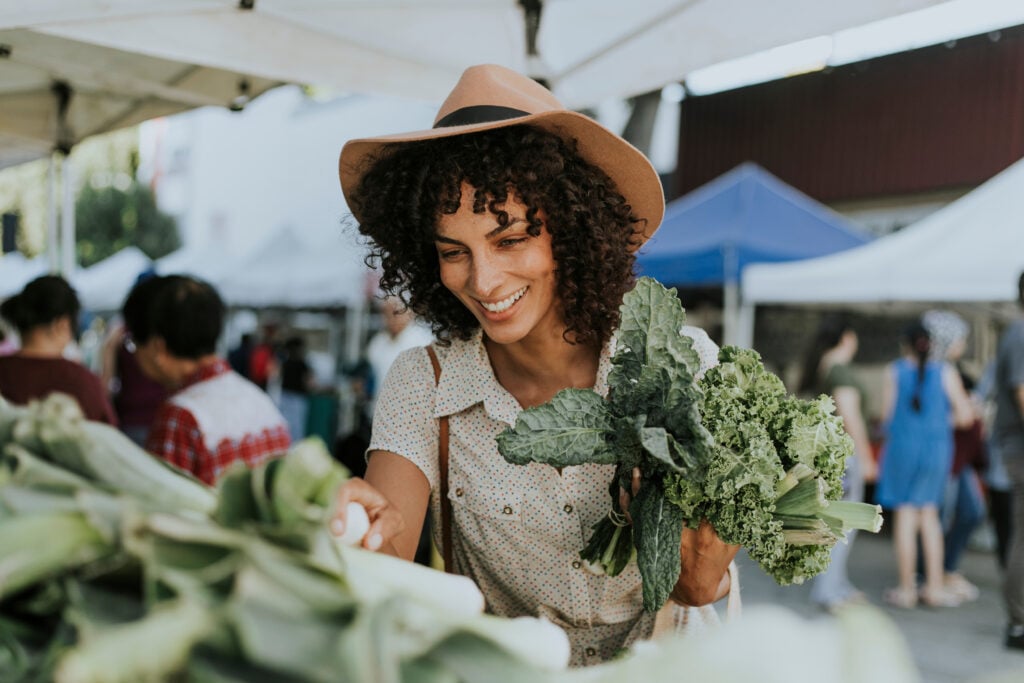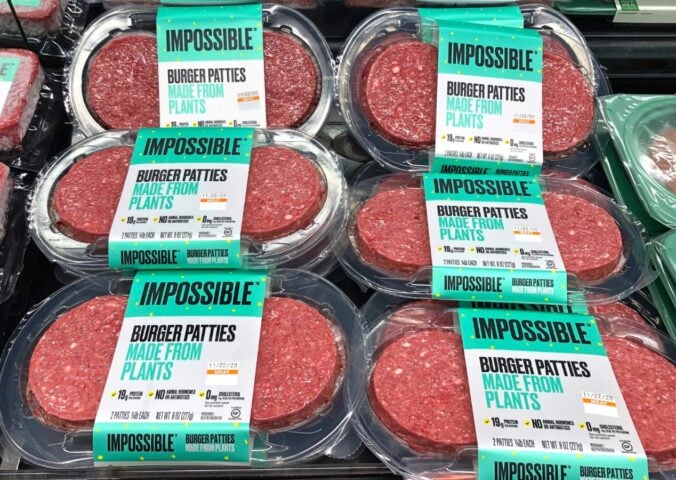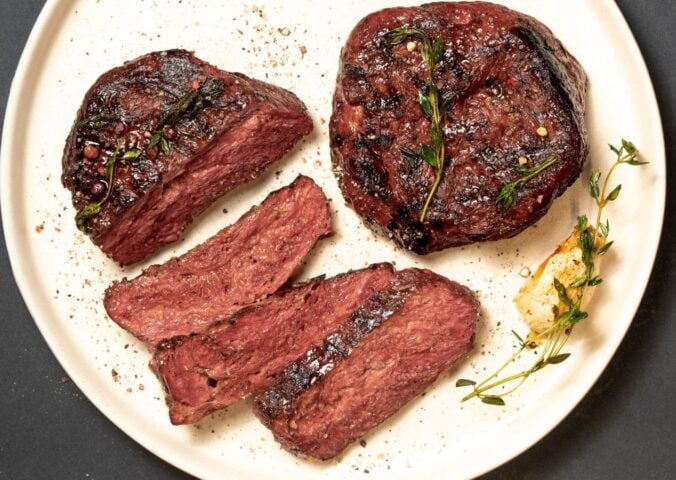More and more people are ditching meat and adopting plant-based diets for the sake of the animals, their health, and the planet. If you’re already meat-free, you may be considering moving away from animal products altogether and going vegan.
Adopting a fully plant-based diet has been highlighted as the best thing we can do to reduce our carbon footprint, as well as our contribution to animal suffering. Many experts have stated that a global shift away from meat is essential to avoid climate catastrophe. We also farm and kill 80 billion land animals a year for food, and more and more people are ditching animal products over ethical concerns.
Many people who go plant-based do so after a spell of vegetarianism, but it can often be daunting if you don’t know where to start.
Plant Based News (PBN) spoke to a range of nutritionists and other experts for their tips on how to successfully move to a plant-based vegan diet. From the best supplements to healthiest foods to eat, here’s everything you need to know.
NB: This is a general guide only. You should always contact your health professional for personal advice on your diet and health
How to start a plant-based diet
Many people who go vegan on ethical grounds will immediately eliminate animal products from their lives. This is often because they have discovered the truth about the brutality of the animal agriculture industry, and “cold vegan turkey” will be the only viable route for them.
If you are going plant-based for other reasons, and are concerned that you may not stick it out, some nutritionists recommend a more gradual approach. Adopting a plant-based diet more slowly can sometimes offer the best chance of success.
“Some people find it easier to transition gradually, eliminating one animal product at a time,” Mary Sabat, nutritionist and health coach, tells PBN. “For example, you can start by cutting out dairy, then eggs, and finally other animal products. This approach allows your taste buds and habits to adjust more comfortably.”
What to eat on a vegan diet
Veganism is not a diet, and those following the lifestyle may not necessarily want to eat the healthy wholefoods diet that we traditionally associate with plant-based eating. Some people find it easier to start off their new diet by eating plant-based versions of their favorite animal foods. In 2023, this couldn’t be easier to do.
Supermarkets are often stocked with vegan cheeses and meats, and the plant-based egg market has been skyrocketing in recent months. You can also buy vegan meals from a number of meat-heavy fast food restaurants, including Burger King, McDonald’s, KFC, and Nando’s.

If you would like to follow a healthy plant-based diet, it should include, according to experts, a wide array of fruits, vegetables, whole grains, legumes (like beans and lentils), nuts, and seeds. “This variety ensures you receive an adequate range of essential nutrients,” says Tully Zander, nutritionist and owner of Vegans First.
It can also be a good idea to try out other foods you may not have given a second thought to when vegetarian. “Explore new plant-based foods and recipes to keep your meals interesting and satisfying, recommends Melissa Wasserman Baker, dietitian, nutritionist, and founder of Food Queries.
Vegan foods with protein
Contrary to popular opinion, getting enough protein shouldn’t be a problem for those following a plant-based diet. According to Wasserman Baker, you should aim for the following foods to maximize your protein intake:
- Legumes
- Tofu
- Tempeh
- Seitan
- Edamame
- Quinoa
(Find more tips about plant-based sources of protein here)
Vegan foods with calcium

Many people believe that calcium exclusively comes from dairy, but there is plenty to be found in plant-based foods as well. When you switch to a vegan diet, Wasserman Baker recommends eating the following foods for calcium:
- Fortified plant-based milk
- Calcium-set tofu
- Leafy green vegetables (such kale and collard greens)
- Fortified plant-based yogurts
Vegan foods with iron
Iron deficiency is often associated with meat-free diets, but there’s no need to worry if you eat the right plant foods. Wasserman Baker recommends the following:
- Legumes
- Tofu
- Tempeh
- Fortified cereals
- Spinach
- Dried fruits
She also advises eating vitamin C-rich foods with iron-rich meals to maximize iron absorption. These include citrus fruits and bell peppers.
Additionally, an increasing number of plant-based meat products are fortified with iron (just check the label).
Vegan foods with omega-3
Omega-3 is typically associated with fish, and some vegans may wonder where best to find it in plant-based sources. Thankfully, there is no need to consume fish oil to ensure you’re getting your fix of it. Wasserman Baker advises choosing the following:
- Flaxseeds
- Chia seeds
- Walnuts
- Hemp seeds
- Algae-derived omega-3 supplements
Veganism and B12
Both vegetarians and vegans may worry about getting adequate amounts of B12, which isn’t typically found in plant-based foods. While some people are wary of supplements, many do not realize that farmed animals tend to be supplemented with B12 in the first place. B12 is produced by bacteria, and it’s also found in soil. Modern farming and soil deficiencies means that it’s difficult for both humans and non-human animals to get B12 naturally.
Wasserman Baker recommends choosing a reliable B12 source, which will generally mean taking a supplement. You can also find B12 in fortified plant-based milk, breakfast cereals, vegan meat, and nutritional yeast. You can learn more about getting enough B12 as a vegan here.
The best supplements for a vegan diet
You should always speak to your doctor or a registered dietitian if you are concerned about supplements. As a general rule, someone following a well-planned vegan diet may only need to supplement with B12. Regardless of what diet someone follows, however, other supplementations are sometimes necessary.
“Consider working with a healthcare professional to determine if you need any additional supplements based on your individual needs and potential nutrient gaps,” advises Wasserman Baker.
Things to bear in mind when switching to a vegan diet
Adopting a plant-based diet can often be a learning curve, as many food items contain “hidden” animal ingredients. Examples of these are whey and casein (milk proteins), gelatin (an ingredient made from animal bones), and honey (produced by bees).
In the UK and many other countries, some animal ingredients on packets will be in bold, as they tend to be known allergens. These include milk and eggs. Some, including honey, gelatin, and many meats, are harder to spot on labels.
Tips for eating out as a vegan
A few years ago, being a vegan at a social event that involved food may have been a difficult experience. Nowadays, however, vegan options are plentiful in a number of restaurants around the world. As awareness of veganism grows, many people are also happy to accommodate plant-based guests.
Sometimes, though, navigating through social situations with non-vegans can be a daunting task for those new to the lifestyle.
“Let’s address the elephant in the room, the social aspect, says Jennifer Kropf, the editorial director and expert at Healthy Happy Impactful. “Navigating family dinners, parties, and dining out can be a bit tricky when you’re the lone vegan in the crowd. It can sometimes feel isolating if your choices aren’t understood by those around you.” She recommends keeping a few “tried-and-tested dishes” up your sleeve for social gatherings, as well as familiarizing yourself with vegan-friendly eateries.
“And remember, support is key,” she adds. “There’s an amazing community of vegans out there, both online and in person.”
Why go vegan over vegetarian?
For many people who go vegan on ethical or environmental grounds, the vegetarian diet isn’t enough to alleviate their concerns.
The dairy industry, as well as being responsible for around four percent of global greenhouse gas emissions, also causes immense suffering to cows. There are over 270 million dairy cows in the world, and a growing number of these are being raised on factory farms.
Cows used in the dairy industry will be forcibly impregnated each year from the age of around two. Each time they give birth, their calf will be taken from them hours after they’re born. Mother cows will often cry and bellow for their babies for days after they’re gone. Due to the conditions they’re kept in, lameness and mastitis are common in dairy cows. When their bodies are worn out and they stop producing milk, cows will be sent to the slaughterhouse.
The egg industry is also rife with animal welfare concerns. Worldwide, more than seven billion hens are kept in egg factories. The majority of these will be kept in small battery cages that offer them an area around the size of an A4 sheet of paper. In countries where battery cages are illegal, such as the UK, they may be kept in so-called “enriched cages” with up to 70 other hens. In both cage systems, hens are unable to exhibit natural behaviors like spreading their wings, walking, and foraging.
Male chicks born into the egg industry are surplus to requirements, so they are therefore killed soon after being born. This is often done by gassing, or they may be thrown into an industrial macerator while still alive.
Bottom line
Choosing veganism over vegetarianism is often considered the most effective way to minimize your impact on animals, as well as the planet. In addition, balanced plant-based diets have been continuously linked to improved health outcomes. And, as the worldwide vegan movement grows, it is becoming ever easier to make your life as cruelty-free as possible.





